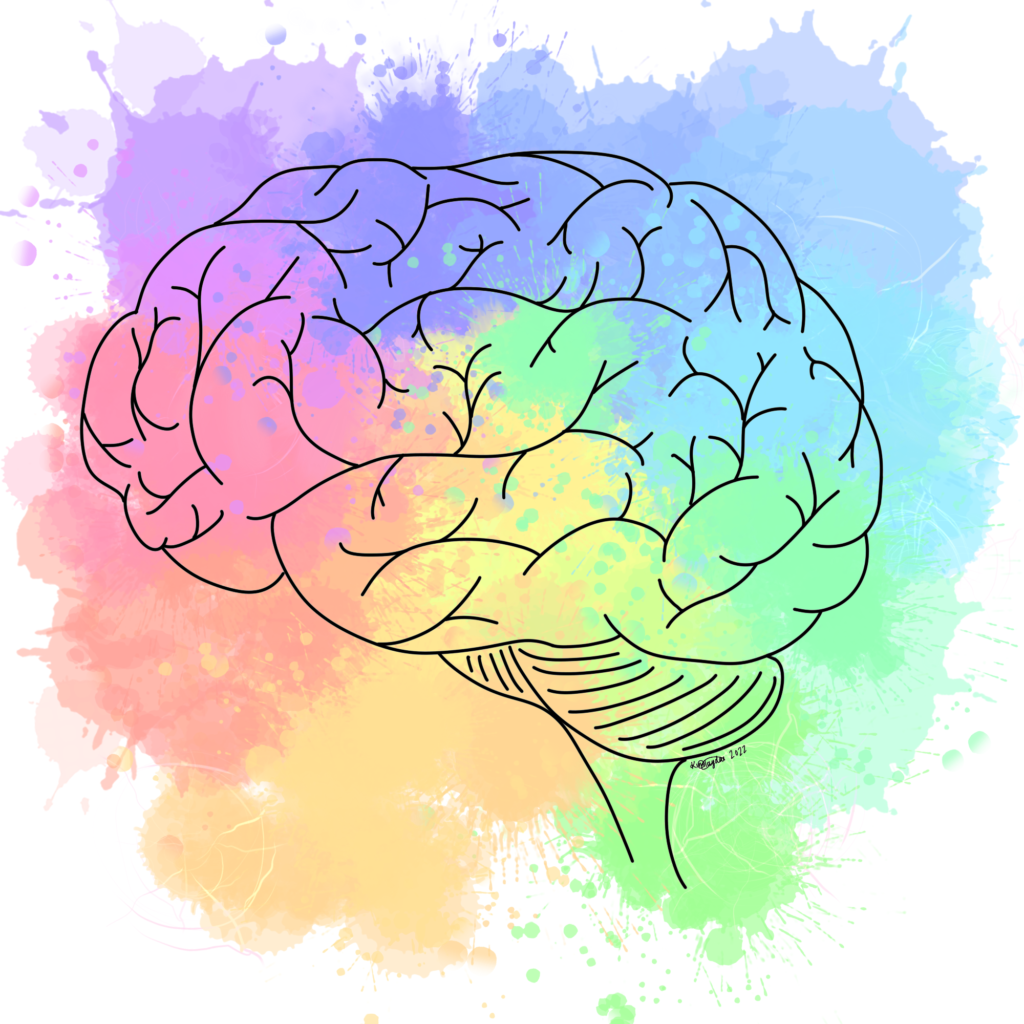
Firstly a HUGE welcome to my website and/or blog! It has been a while since I last managed to sit down and finish a whole blog to publish, so thanks also for your patience. Today, I wanted to go through the 4 main neurotransmitters or chemicals we want to be able to release each day to feel happier, cope better with the world around us and generally feel good!
The easiest way to remember these is with the sweet little acronym D.O.S.E. I will go into the detail of your daily D.O.S.E for a happier brain, how to know when you are lacking and what you can actively do to boost them. They are dopamine, oxytocin, serotonin and endorphins and we are going to break them down and look at these today in how we can boost them for our own happiness and well-being.
This blog came about because a lovely friend wanted a ‘cheat sheet’ so they could identify what they needed and how to get them. I created a graphic for the awesome HMSA charity, I will pop it here too as a free download, so you have access to a simple, clean and handy poster that you can print off or save on a device! Not bad ay? 🙂
Why D.O.S.E?
Being happy isn’t a given, some people have to work harder to maintain happiness and good mental health than others. However, there are ways of improving your overall happiness and well-being by utilising your brain’s natural neurotransmitters. It isn’t ‘brain hacking’ but another way to have a look into what you may be lacking and how to improve it, because who doesn’t want to feel good?
There is a common misconception about boosting happiness, it isn’t uncommon to think that your career/relationship/ status or material possessions are what makes us happy. However, happiness is much more of a journey, and something we can absolutely create by ourselves.
We know that when we sleep well, it has a positive effect on our mood, and our ability to function and cope in life. There are other mechanisms at work here, but that’s for another blog… When you feel good, you are getting a mix of neurotransmitters, all helping you towards that feeling of happiness, each chemical has a job to do for you, and having an understanding of these can help you to feel more balanced and in control.
We don’t get the right amount released all the time, and sometimes we have to do things to help them along their way. In fact, some folk, especially those who have ADHD, we are seeing dopamine deficiency, so the lack of motivation for tasks is real! That doesn’t mean that we can’t mine for some dopamine to help with our motivation though, so this is why it is important to identify what we are feeling and how we can boost those chemicals to help. So without further ado, let’s get stuck in…
Dopamine – the reward chemical
When we are getting a good amount of dopamine, it enables motivation, concentration, learning and pleasure. It also promotes determination to accomplish goals, desires and needs. Let’s take a look now at how we may know we are lacking in dopamine.
If you are lacking in dopamine, it will generally show up in how you are feeling and thinking about things. Common indicators are:
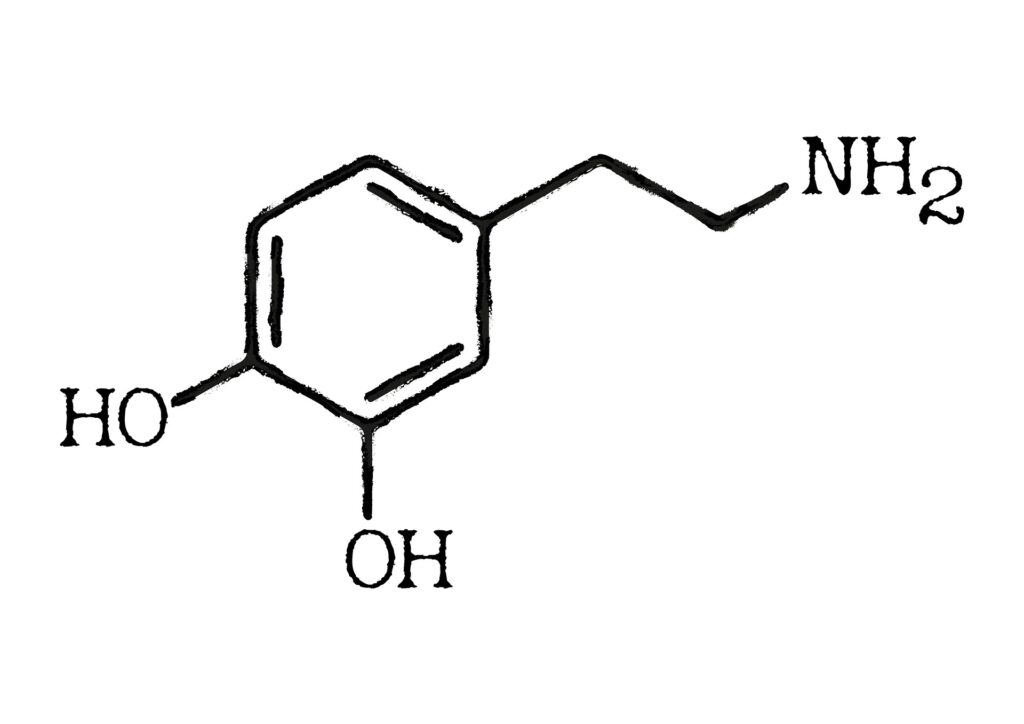
- Procrastination
- Mood swings
- Inability to focus
- Feeling anxious
- Low energy/Fatigue
- Lack of motivation
- Low self-esteem
- Feeling hopeless
Sounds horrible right? Don’t worry, here is how you can boost the dopamine being released. Breaking down big tasks into smaller ticky boxy tasks. More ticks equal more dopamine! Also can help with the big tasks to not feel so overwhelming when we break them into more bite-sized chunks too! Make sure you keep moving your body/ exercise regularly, as this has been shown to help regulate dopamine levels in the brain. Creativity, writing, crafting and baking, all help with dopamine and other neurotransmitters too! I am feeling it right now as I write this for you, crochet also does this for me, I LOVE IT!
Eating food is a strange one, mainly because there are evolutionary ties to the dopamine release when we eat and that is another blog’s worth of information for you. I will come back at a later date and link to that blog when it is written for you in the future. Just very simply put for now, when we eat, our brain rewards us because we are doing something to good to ensure our survival.
Doing self-care activities releases dopamine because our brains love it when we do things we like. Be it listening to music, relaxation, or a nice-smelling candle you decide to light because you like the fragrance, your brain sends you dopamine!
Oxytocin – the love chemical
Oxytocin isn’t just about babies, breastfeeding and bonding, although it is AMAZING for that. There is a lot more to it and we will see why soon. Oxytocin increases trust and motivation to build and maintain our relationships. You may have heard it being referred to as the ‘love’ or ‘cuddle’ hormone. Like all neurotransmitters, we have signs of when we are lacking in them, which is good if we know what to look for! Signs include:

- Lack of motivation
- Feeling anxious
- Disconnection of relationships
- Insomnia
- Low energy/fatigue
- Stressed
- Feeling lonely
Here is how we can increase them… (do you see a pattern here for this blog lol) If you have a pet, pet them, cuddle them, spend time with them, fuss them. Physical touch such as holding hands with another, touching their arm in comfort etc. Hugging loved ones for at least 30 seconds and a really lovely one is the giving or receiving of compliments! Have you complimented someone recently? I do this all the time for people because they absolutely deserve the boost and to feel good.
Serotonin – the mood stabiliser
This is the one I talk about A LOT. If you have been around me or my socials for a while, it really is an obsession of mine this beautiful serotonin. Why? Because it has a variety of awesome functions it helps with, when we know how to release it. For today, we are keeping it simple, and talking about serotonin as the mood stabiliser, when released in the right quantities it also improves your general well-being, and happiness and creates positive emotions, and more positive thoughts and plays a role in our social dynamics. When we are lacking in serotonin, this can show up in a variety of ways, such as;
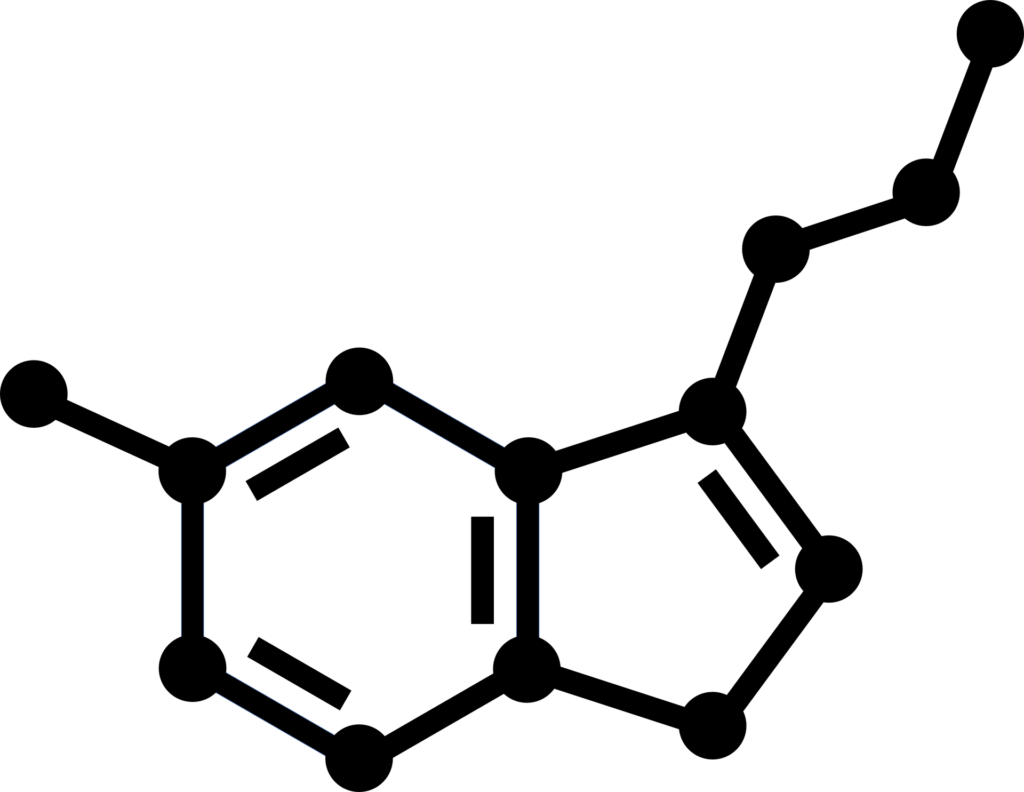
- Anxiety/Panic attacks
- Overly sensitive
- Mood swings
- Social phobia
- Insomnia
- Low self-esteem
- Obsession/Compulsion
What is very interesting is that 95% of serotonin production is in the gut! How cool is that? Your brain still gives the signal for it to be released but it gives us a much stronger idea of just how linked our brains and bodies are.
There are some lovely, accessible ways in which you can boost your serotonin. Getting enough sunlight is very important and why folk struggle with SAD syndrome in winter is because we can’t get enough. Getting out in the sunlight earlier in the morning can help. Meditation, massage and cold showers can boost serotonin too. Being in nature works too, even if it sitting in your garden, going to a local park etc, you can incorporate that with movement too which also aids in producing serotonin. This can include more accessible ways to move which are low to non-impact, like walking with walking aids if needed, cycling and swimming.
Endorphines – the painkiller
Our natural pain killer. It is released in response to acute pain or stress. This does also play a part in our sense of general well-being. Some signs that you need an endorphin boost are;

- Impulsive behaviour
- Anxiety
- Depression
- Insomnia
- Aches and pains
The main ways in which you can boost your endorphin production is by laughing with others, watching a comedy, moving your body, eating dark chocolate, essential oils or a smell that brings you joy, crying, eating spicy food and stretching.
This isn’t an exhaustive list, there are some other ways in which you can get these chemicals to be released, however, these are the ones that I found to be the most accessible to achieve. I will also drop the original poster I created for the HMSA charity below, so you can save it to your device, or even print it off and stick it on your wall as a handy reminder!
I truly hope you have found this blog useful, do let me know in the comments your thoughts.
Until next time,
Take care and self-care!
Kim Clayden
Solution Focused Psychotherapist, Clinical Hypnotherapist.
HPD, DSFH, MNCH (Reg), CNHC (Reg), AfSFH (Reg)
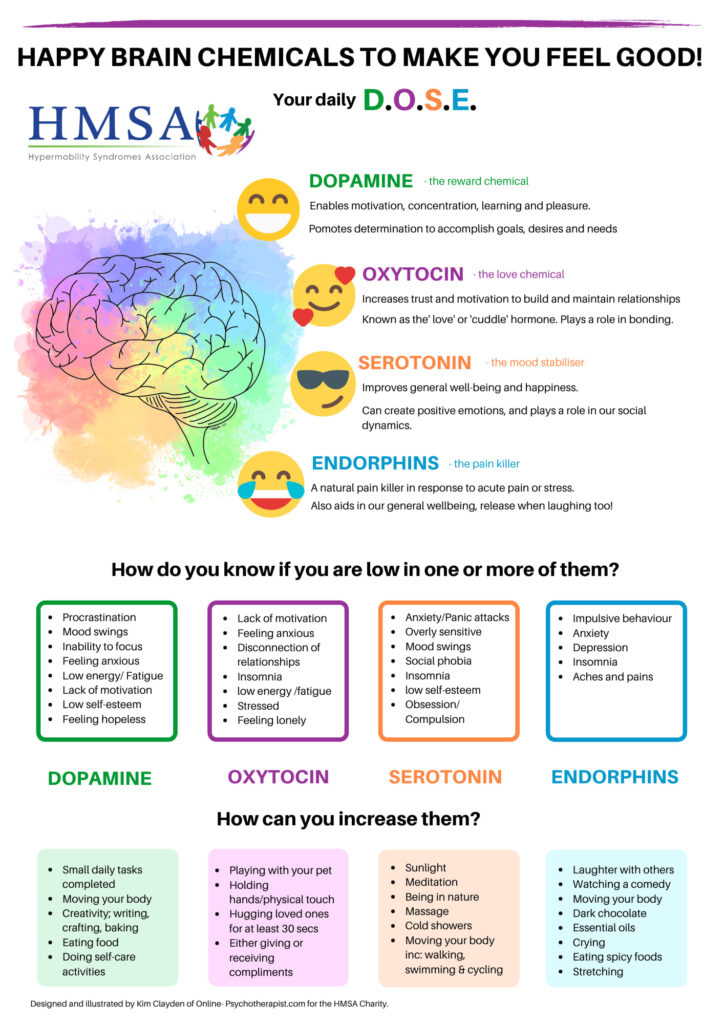
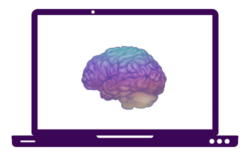
Excellent article, Kim! I’m curious about your food and dopamine knowledge now haha. “95% of serotonin production is in the gut!” was definitely a random fact I did not know that I now do.
Awww, thanks! I will write a blog around food/dopamine/weight management soon. Very simply, dopamine is released when we eat to encourage us to eat. This is because we need to eat to survive and procreate, so the brain encourages that for you and as we know it isn’t always in a good way. A lot of ADHD folk will eat for stimulation purposes. A good rule of thumb is, if you haven’t seen for around 3 hours, then go for it, if you have – you are seeking stimulation, and there are other options to help with that 🙂